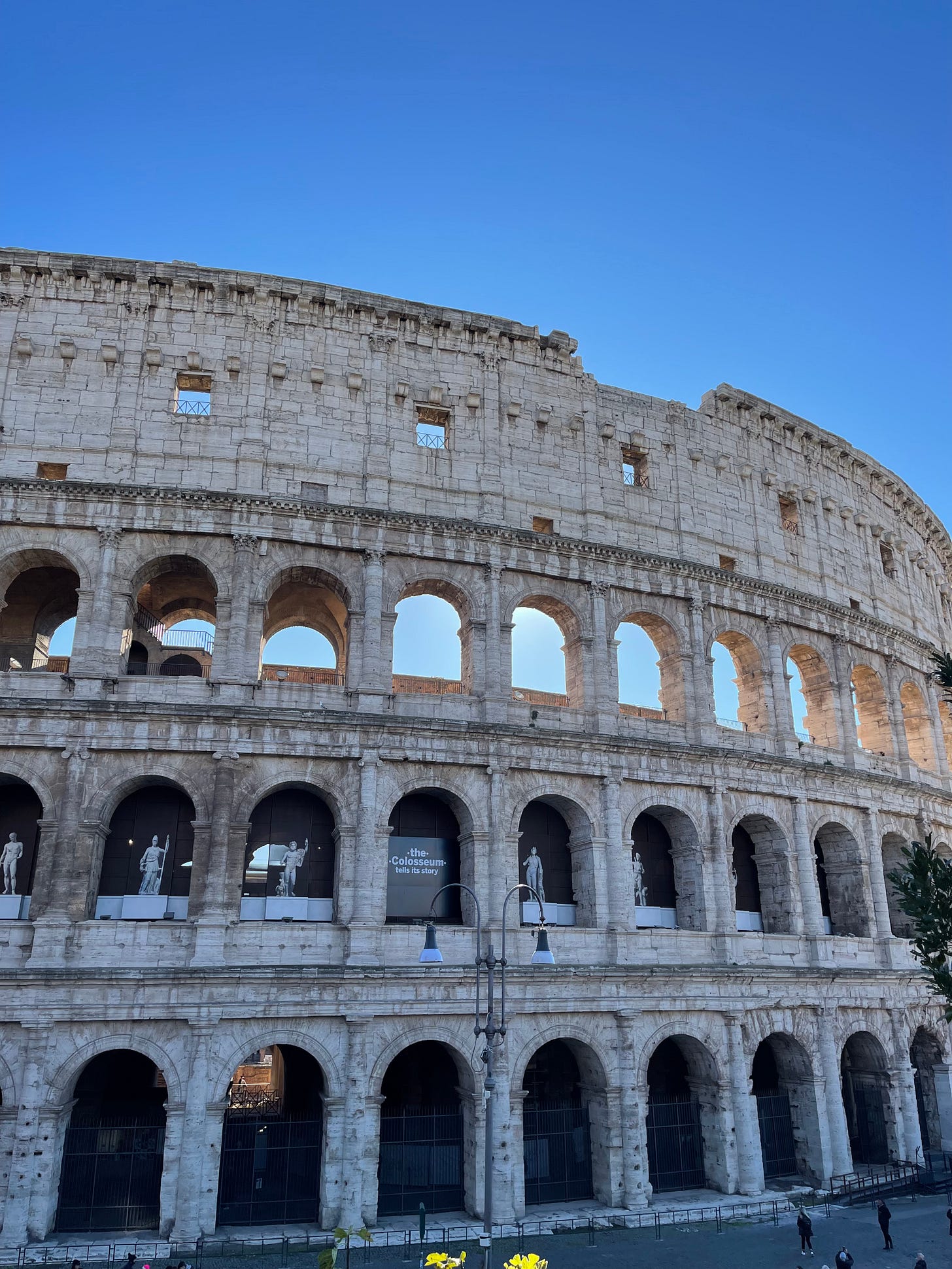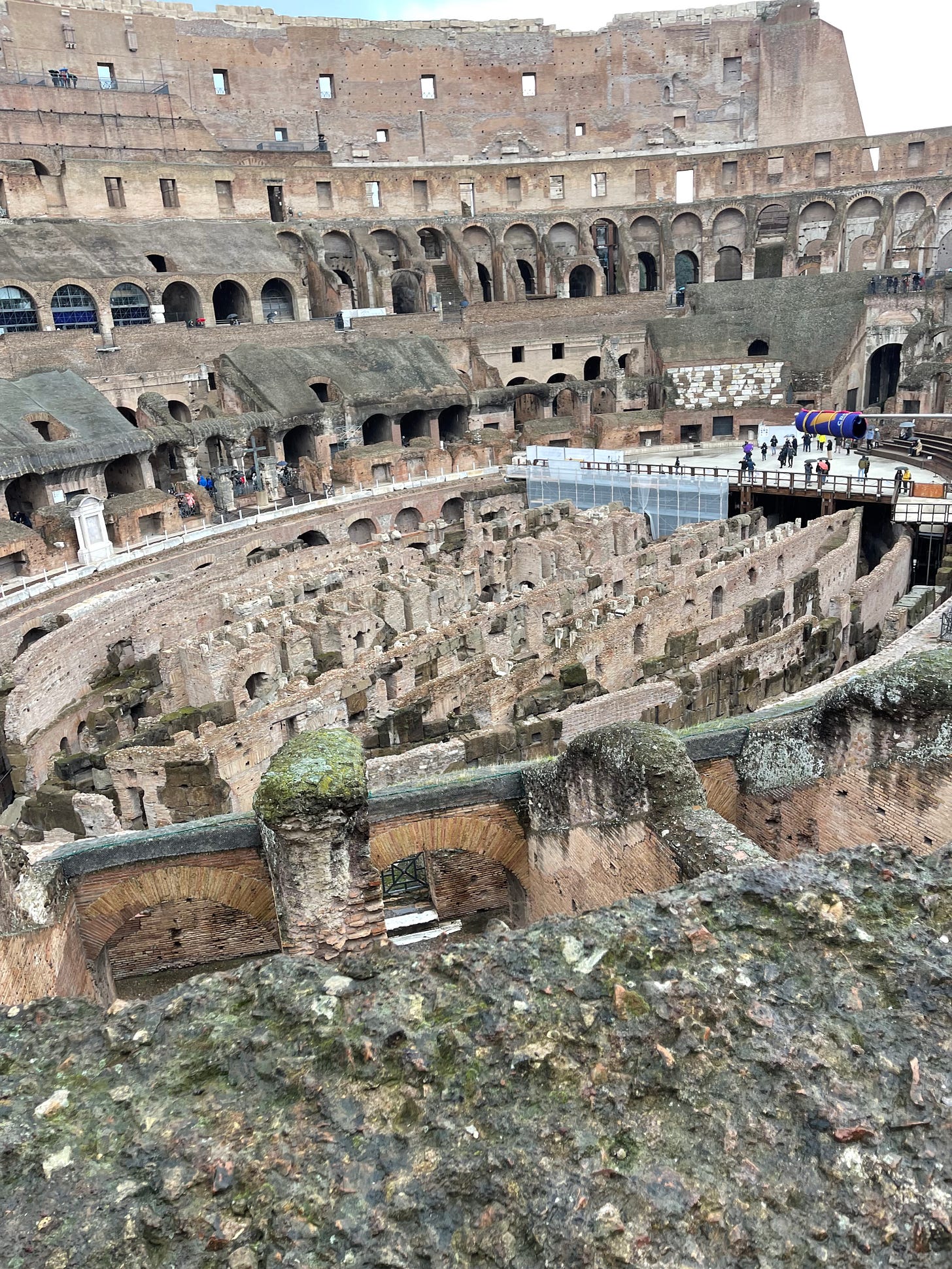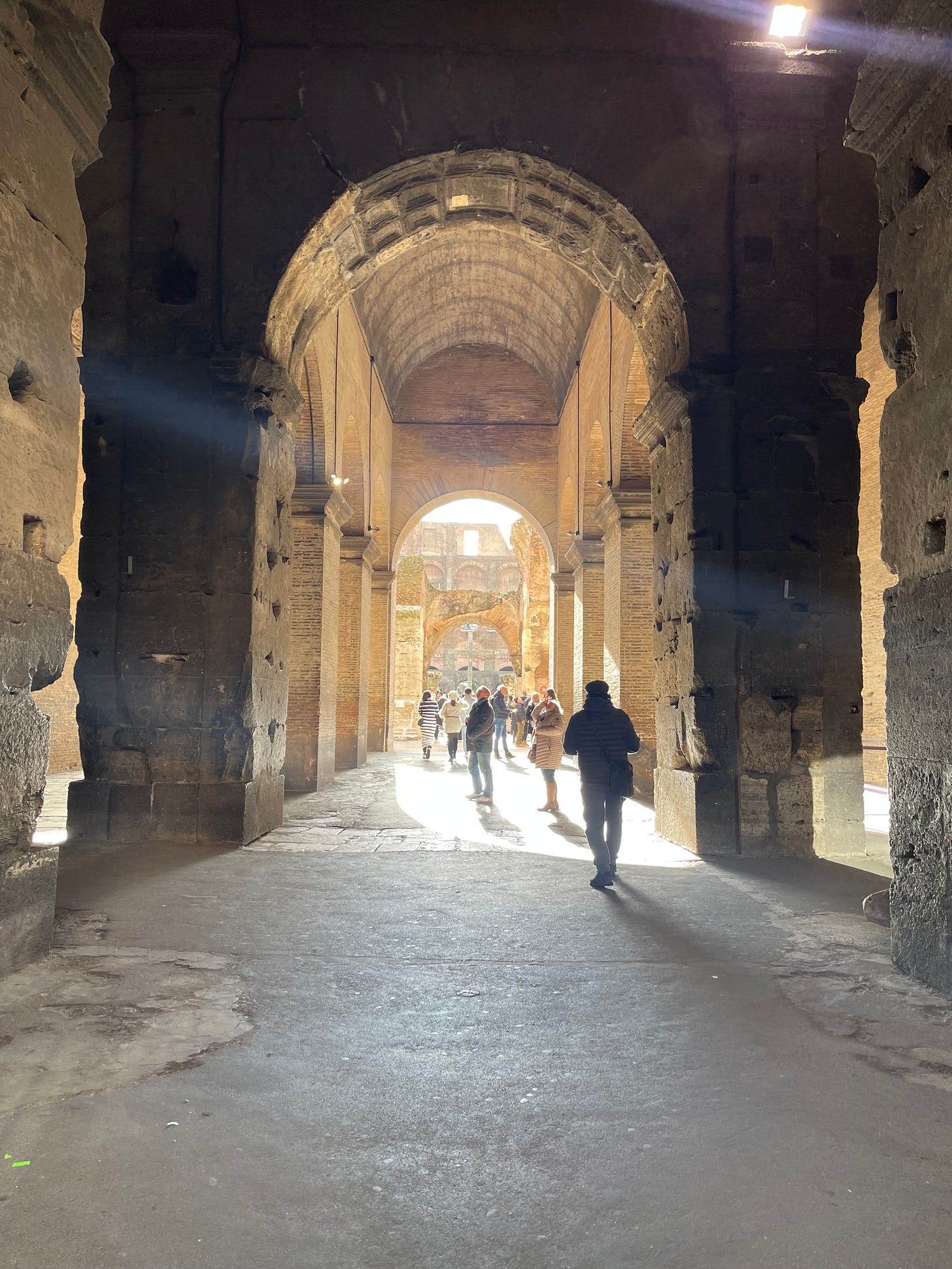Eating up the "bread and circuses"
After the Harris campaign lost the 2024 presidential election, I went to Rome to take a break. While here, I've been learning lessons about the past and rethinking our present and future.
Ciao da Roma. It’s been over a week since I arrived and settled into my 475-square-foot apartment in Testaccio. All those years living in New York City gave me good training on how to live in small spaces. I’ve got no dryer, no microwave, and no desk, but it’s starting to feel like casa (at least for a short while).
Since I’ve been here, I’ve been averaging 25,000 steps a day as I traverse throughout the city, visiting sights like the Vatican, the Colosseum, and the Roman Forum. I’ve dubbed my time here my “walk, think, write” tour. While I’m here, I’ll share what I’m experiencing and how it’s inspiring me, and hopefully, you as well to do something different outside your traditional day-to-day.
But first, some background:
This past year has been a hectic and challenging one for me. In January, my partner moved across the country to Silicon Valley to further advance his software engineering career. Although we’re still together, seeing each other once a quarter for about a week, his absence left a hole in my heart. I filled some of the emptiness by spending time with my amazing friends, most of whom are smart, successful single women whose calendars are booked up weeks in advance. Having these friends has been a lifeline for me, but something was still missing. It took me a while to realize what I was doing with my time wasn’t satisfying. I routinely felt demotivated and depressed, which isn’t how someone who knows me would ever describe me. Every day, I woke up and thought: “This can’t be the rest of my life.”
It wasn’t that my job at Amazon was bad. There were many things I enjoyed about it. For instance, Amazon is full of oddities, challenges, and ambiguity. I live for a challenge. I love solving problems. However, I’m fortunate to have reached the top of Maslow’s hierarchy of needs (for now), and there’s room in my brain to have big thoughts, like: “What is the point of life?”
After hitting my 3-year mark at Amazon, I got the incredible opportunity to join the Kamala Harris campaign to lead the Social Video team. It felt like a call from destiny and I knew I had to do it. I packed up my apartment in NYC and moved to Wilmington, Delaware, the campaign’s headquarters. For three months, I worked every single day, including Saturdays and Sundays, at least 16 hours a day, with a talented group of people who were passionate about politics, the state of the world, and democracy. It was exciting, invigorating, draining, and daunting, all at the same time.
In the end, we lost. For many, this was shocking. For me, someone who has worked in media as a journalist for 13 years, it was not. Donald Trump had been campaigning for almost a decade. He’s an incredibly popular and infamous figure. In addition, the Republicans have a powerful media ecosystem that they created, cultivated, and grown since its early inception of conservative talk radio in the 1980s. Three months of presidential campaign marketing could not defeat decades of Republican messaging and coalition building. But the Harris campaign still did important work that inspired audiences and gave people hope, and I’m grateful to be a part of that movement.
The job itself tested my skills in social media, creative directing, executive producing, and marketing. If I ever doubted whether I knew how to do my job, this role showed me I know what I’m doing and I’m an expert at it. In some ways, the campaign affirmed my sense of self, but in other ways, it made me face some truths about our nation, like Americans want money, success, and power and they will support whoever they believe will get them there the fastest.
So, what does all this have to do with Rome? Well, initially, nothing. I booked my ticket to Rome well before Trump defeated Harris, back in October. I wanted to spend time with my partner in a place that challenges our senses and inspires our relationship. However, my trip to Rome turned into something else, a period of reflection. There’s something fascinating about going to Rome, the birthplace of representative democracy, after working tirelessly to get Harris elected.
The here and now:
There have been countless comparisons between the state of America today and the fall of the Roman Empire. It’s not an original idea. The Roman Empire was around for a thousand years and America has been around almost 250 years. There are many parallels between the Roman Empire and America. For instance, we both share similar systems of government. The founding fathers looked to Rome for inspiration when creating the three branches of government just like the threefold system of government used by the ancient Romans. Other similarities include both being republics, having legalistic societies that value a court of law, and being multicultural nations. The Roman Empire prospered for hundreds of years before greed and corruption led to its decline and ultimate downfall.
In America, we’re seeing the disappearance of the middle class and an exponential rise in the wealth of the elites. In 2024, corporate profits reached an all-time high while Americans’ purchasing power declined by 7% since January 2021. Around 44% of U.S. adults can't afford a $1,000 emergency expense. And yet, America is also home to 759 billionaires whose wealth skyrocketed during and after the pandemic. The average American is one health crisis away from having their financial lives upended–that’s not how the rest of the world functions, but in America, that’s what the people tolerate and accept.
During my first week in Rome, I did a walking tour of the Colosseum with an archeologist named Alex. The Colosseum was built by Roman emperors to entertain the masses. It was an epicenter of human bloodsports and spectacles. It’s estimated that 400,000 people from gladiators to slaves to prisoners to the religiously prosecuted were killed in the Colosseum over its 350 years of use.
The term “bread and circuses” or in Latin “panem et circenses” epitomized the power of the Colosseum as a tool to distract the public from their larger problems. The term was used to criticize the "selfishness" of the people and implies a population's erosion or ignorance of civic duty as a priority. The fall of the Roman Empire came from the greed of its leaders and government. The empire expanded so far and wide, stretching from the British Isles in the northwest to Egypt and Mesopotamia in the southeast, and many of its people were starving. Eventually, its citizens from the north rained down on Rome, ransacking its city center, and thus, the empire collapsed.
We live in a time of our own “bread and circuses.” The average American spends about 4 hours and 37 minutes looking at their phone every day. That turns into 1 day every week, 6 days every month, and 70 days every year. And the global average daily phone usage isn’t far behind, averaging 3 hours and 52 minutes. Of course, our phones have become an extension of ourselves, helping us communicate with friends, family, and colleagues, pay bills, provide directions, and more. But mostly, people use their phones to consume content, watch the news, play games, and shop online. We’re terminally online. It has changed the way we communicate and what we value.
We’re living through the “memefication” of life, where everything is a joke, but not everyone is in on the joke. Access to divisive content, cheap entertainment, easy credit, and endless products are our “bread and circuses.” It keeps our attention occupied and prevents us from asking larger questions, like why is the American healthcare system so overpriced and dysfunctional? Or why is our nation’s infrastructure crumbling? Why can’t Millennials purchase a home? Why is the rate of cancer increasing across the country? Why are we OK with the quality of life deteriorating? We don’t ask these questions because we have no time or interest in asking, and that’s by design.
The Colosseum was a symbol of success, strength, brutality, and prosperity for the Roman Empire. Now, its vacant shell stands as a warning in modern-day Rome: If we become too distracted with the “bread and circuses” we’ll lose our humanity and our appreciation for the value of human life.
I don’t share this with you to make you sad, quite the opposite. The more we look back at history, the more we can see that life is an echo, if we let it be. We have the power to create something different, but we need to be focused, intentional, and present for real, productive, and positive change to happen. So whenever you remember to, maybe tuck that phone away or turn off your TV, and go outside for a walk, speak to your neighbor, or do something that reminds you that we are all human and that our time is finite.








